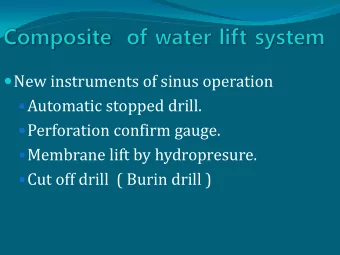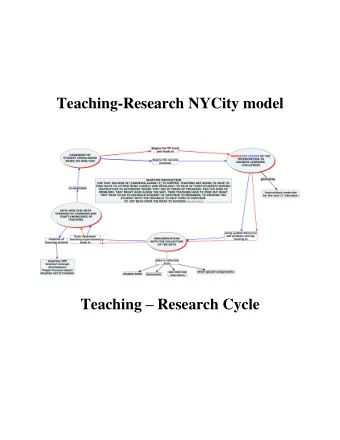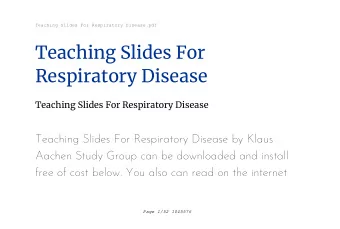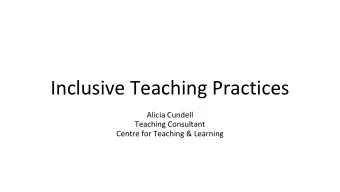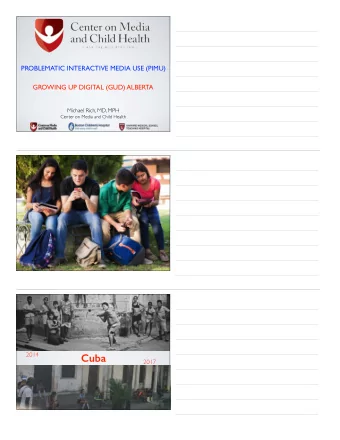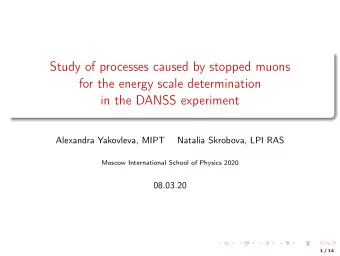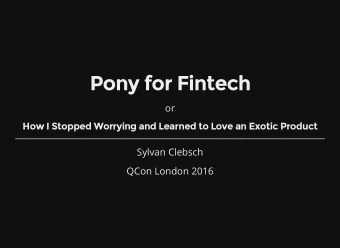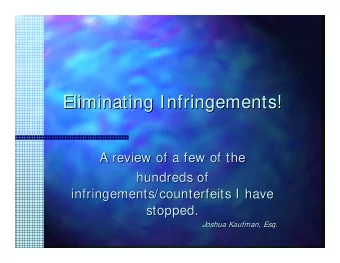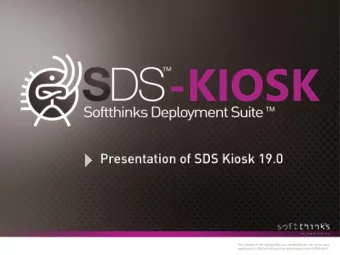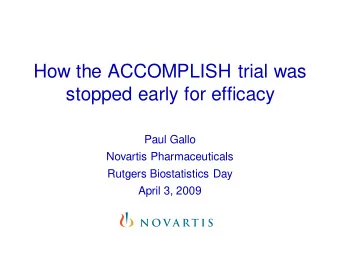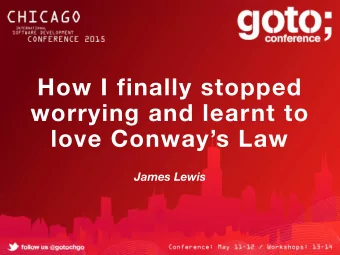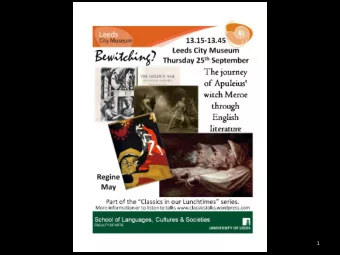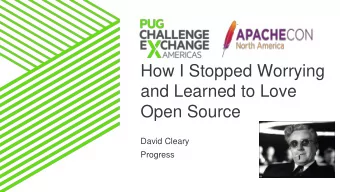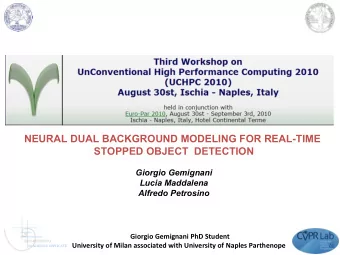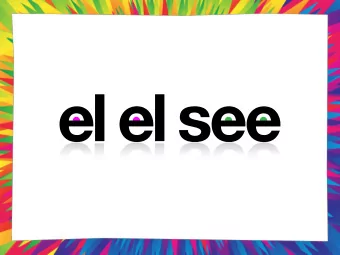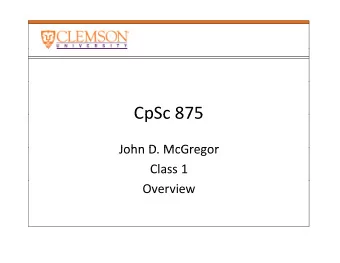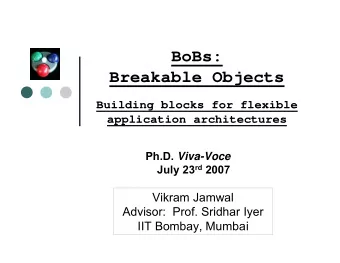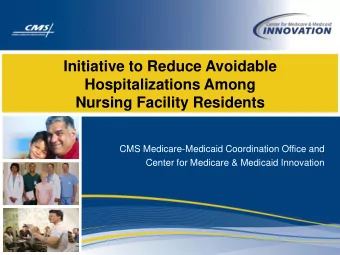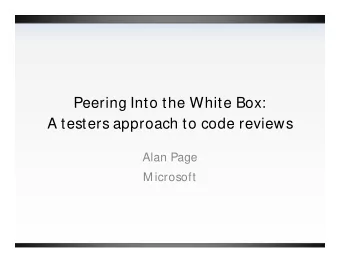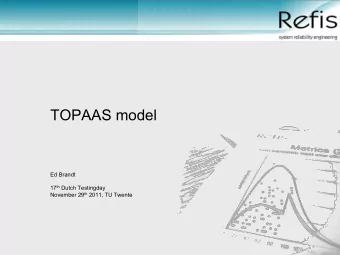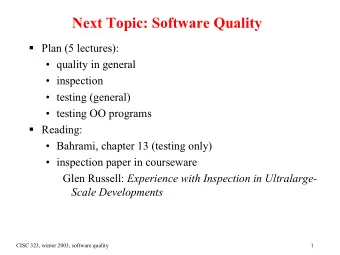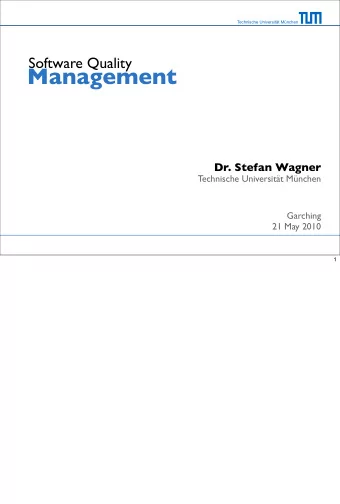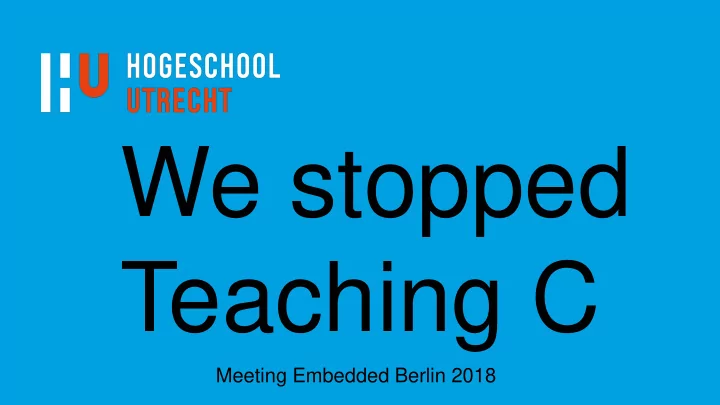
We stopped Teaching C Meeting Embedded Berlin 2018 We Jorn Bunk - PowerPoint PPT Presentation
We stopped Teaching C Meeting Embedded Berlin 2018 We Jorn Bunk Wouter van Ooijen jorn.bunk@hu.nl wouter.vanooijen@hu.nl Topics Context: institute, curriculum, trends Why skip C Experience Conclusions, questions
We stopped Teaching C Meeting Embedded Berlin 2018
We Jorn Bunk Wouter van Ooijen jorn.bunk@hu.nl wouter.vanooijen@hu.nl
Topics • Context: institute, curriculum, trends • Why skip C • Experience • Conclusions, questions
Dutch higher education Universities Universities of applied science (HBO, ~ polytechnic) HBO Utrecht institute HBO-ICT specialization Computer Engineering (Technische Informatica) ~ 6 lecturers
Our institute HBO-ICT, specializations: • Applied Artificial Intelligence • Buisiness Information Management • Software & Information Engineering • Systems & Network Engineering • Technische Informatica (Computer Engineering)
Our institute Profiel Richting Basis Artificial Intelligence (bijv. Big Data & Social Media, Creative Industry) Applied Artificial Intelligence Data Science Business Analist Business IT & Management Interaction Designer Afstuderen Stage Minor Front-end developer Foundations Software Development of the ICT Back-end developer Cyber Security System and Network Engineering Cloud Engineer Embedded Systems Technische Informatica (e.g. robotica, IoT) Jaar 1 Jaar 2 Jaar 3 Jaar 4
Our institute 4 y ( 4 * 60 = 240 EC) • 0.5 y (30 EC) common introduction • 1.5 y (90 EC) specialization (BIM, SNE, SIE, AAI, TI) • 2.0 y (120 EC) internships, profile, minor
Computer Engineering • ~ 60 students/y (2 or 3 classes of 20..30) • Focus on close-to-the-hardware and resource-constrained: Embedded, micro-controllers, robotics, Linux • Mostly C++, but also Python, Assembler (,C) + We work with physical stuff - Technical work seems to be frowned upon (in our country)
Quarter rhythm 9 weeks • 6 weeks: 2 classroom courses • 3 weeks: 1 group project
Common first half-year Q1 • Programming (Python) • Computer systems & networks • ICT and organization Q2 • Modelling (BPMN, use-cases, databases) • ASK (Critical thinking, logics, statistics) • Group project (collaboration, agile, professional skills)
Computer engineering – y1 Q3 • procedural programming (algorithmics, C++) • operating systems (Linux, RaPi) • Lego Robotics (Lego + BrickPi, C++) Q4 • OO programming and micro-controllers (classic C++, ArduinoDue) • Digital and analog electronics, computer architecture 1 st year final project (individual, ArduinoDue, C++) •
Computer engineering – y2 Q5 • Low-level programming (assembly, C++, threading) • Real-time modelling (UML & synchronization) • Laser-Tag project (ArduinoDue, RTOS, modelling, waterfall, C++) Q6 • High-level programming (C++, resources, STL, patterns, MSVS, SFML) • Datastructures & algorithms (lists, trees, hashmaps; Python) • Game project (SFML, PC/Linux/Mac, Agile/scrum, Fagan inspection, C++)
Computer engineering – y2 Q7 • MRB (sensors, actuators, control) • Vision (image processing) • Development department (applied research) All students together, changing sub-teams Proposals, team construction, work, dependencies Continuous integration, tests, changing requirements Self-organizing, scrum Q8 • Research • Development department cont. – 15 EC total
Computer engineering – y3/4 Q9 or later • Advanced Programming Functional programming, introspection Python/C++ integration, test-strategy • Applied AI neural networks, classifiers • Inter-disciplinary project (20 EC)
Programming
Some ’recent’ trends • More HBO-ICT integration • First language (shared) Java Python • One 2.5 EC C++ course (classic OO) 4 * 5 EC courses (each 50% C++): 4-fold increase • Smallest hardware PIC16F630 (asm) 18F452 (C) ArduinoDue (C++) • Direct HW register interfacing abstraction of the hardware • Our own lab • The students visit conferences
Course materials 2005: • Book by Skansholm (classic OO) • Book ‘In zee met C’ ( almost K&R C) 2018: • Reader PPC • Reader OOPC • Reader CPSE1 • Reader CPSE2 (+ book)
Course materials Why not use existing material? • Material decides course content • Academic practical Often either for total beginner, or as 2 nd language • • Not up-to-date with the latest standard • English only (we prefer Dutch for y1)
Why skip C? • Focus shift towards abstraction: hardware register interfacing hardware abstraction • No subsequent C courses • No C-only targets • C++ has (slightly) less noise and clutter • Avoid C C++ transition pain Cost: loose pure C programming
Why is programming so hard? 25 25
What to learn? For the students there are two challenges: 1. Syntax 2. (Procedural) Problem solving 26 26
Designing the new course 27 27
Designing the new course 28 28
Designing the course We removed from the course: • Switch • Do-while • Static variabeles • Main function parameters (argc, argv) • MACRO’s • Arrays / c-string • Pointers • Printf() / scanf() • And a lot of (for now) irrelevant details. 29 29
The old reader: integers 30 30
The new reader: integers (1/2) #include <iostream> using namespace std ; int main (){ int number = 6 ; number = number + 1 ; number = number * 2 ; cout << "number: " << number << "\n" ; // number: 14 int x = 8 - 4 ; cout << "x: " << x << "\n" ; // x: 4 } 31 31
The new reader: integers (2/2) #include <iostream> using namespace std ; int main (){ int y = 4.9 ; cout << "y: " << y << "\n" ; // y: 4 int z = 21 ; int result = z / 6 ; cout << "result: " << result << "\n" ; // result: 3 } 32 32
The old reader: output int b = 14 ; printf ( "The square of %d is %d" , b , b * b ); printf ( "%#x %#o" , 90 , 420 ); 33 33
The new reader: output #include <iostream> using namespace std ; int main (){ char letter = 'd' ; cout << "letter: " << letter << "\n" ; // letter: d char result2 = 'c' - 'a' ; cout << "result2: " << int ( result2 ) << "\n" ; // result2: 2 } 35 35
The old reader: input int day , month , year ; int n ; printf ( "Datum in format: dd/mm/yyyy: " ); n = scanf ( "%d/%d/%d" , & day , & month , & year ); printf ( "n: %d\n" , n ); printf ( "The date is: %02d/%02d/%4d\n" , day , month , year ); 36 36
The new reader: input #include <iostream> #include <string> using namespace std ; int main (){ float price ; int quantity ; cout << "Enter price and quantity: " ; cin >> price >> quantity ; float total_price = price * quantity ; cout << "Total price: " << total_price << "\n" ; } 37 37
The new reader: input #include <iostream> #include <string> using namespace std ; int main (){ string sentence ; cout << "Enter a sentence: \n" ; getline ( cin , sentence ); cout << sentence; } 38 38
C-array //get all elements bigger than x from array: int BiggerThan ( int src [], int src_size , int dest [], int x ){ int j = 0 ; for( int i = 0 ; i < src_size ; i ++){ if( src_size > x ){ dest [ j ] = src_size [ i ]; j ++; } } return j ; } 40 40
Vector //get all elements bigger than x from vector: vector < int > BiggerThan ( vector < int > v , x ){ vector < int > result ; for( unsigned int i = 0 ; i < v . size (); i ++){ if( v [ i ] > x ){ result . push_back ( v [ i ]); } } return result ; } 41 41
Other changes: • Learning by example, not by long explanations • Reader only contains correct code. • Exercises: • Other exercises types (e.g. reading exercises) • Each exercise has one learning goal. 42 42
Remaining challenges • Better (and more) exercises • Vector and recursion 43 43
Vector and Recursion int sum ( const vector < int > & numbers , int size ){ if ( size <= 0 ) return 0 ; return numbers [ size - 1 ] + sum ( numbers , size - 1 ); } 46 46
Results: Students became better in • procedural program solving. • debugging the logic in code. Students • are more confident. • have more fun. No transition pain in first week next C++ course. 47 47
so We stopped Teaching C • So far the effect seems to be positive (1y, 60st) • Better start with the better-C subset than C-then-C++ • We don’t cater for all (C is for electro?)
Questions?
We have a few… • What do you (industry) need? • C, C++, both, something else, everything • Specialists, generalists, profssional skills • Electronics, HW interfacing, SW • Specific experience (frameworks, libraries, tools, IDEs, targets) • Is there a future for hard-technical work in western europe?
Recommend
More recommend
Explore More Topics
Stay informed with curated content and fresh updates.
